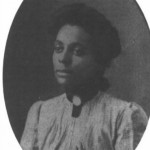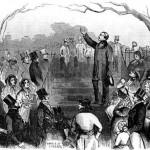A feminist who eventually opposed the passage of the Equal Rights Amendment, Mary Ritter Beard was nonetheless a pioneering scholar and proponent of women’s history. The texts she co-authored with her husband, not to mention fifteen titles of her own, made significant strides in incorporating cultural, social and economic trends into the popular interpretation of American history. Beard was also a major force in obtaining a woman’s right to vote, as established by the ratification of the 19 th Amendment to the Constitution.
Mary Ritter was born in Indianapolis in 1876, to Narcissa Lockwood and Eli Foster Ritter, a lawyer who had been educated at Asbury—now DePauw University. Mary was educated in the Indianapolis public schools, graduating as valedictorian from Shortridge High School, well known for its high standards, distinguished female faculty members and string of illustrious graduates. Matriculating at DePauw in 1893, Ritter studied political science, languages and literature, was elected class president and invited to join Phi Beta Kappa. Upon graduating, she taught German in the Greencastle public schools before marrying Charles Beard, a fellow DePauw alum, whom she accompanied to Oxford. Immersing herself in progressive politics while in England, Beard befriended leaders from socialist, suffragist and anarchist camps and developed an appreciation for the struggles of the working class.
When the Beards returned to the US, they enrolled in graduate studies at Columbia, although Mary discontinued her studies to care for their daughter and throw herself into the suffrage movement. Beard’s feminism was radical insofar as it varied from the mainstream—which, she argued, mistakenly accepted that women’s progress be measured against a male model. Collaborating with her husband in the authorship of such classic texts as The Rise of American Civilization (1927), Mary Beard’s insistence on the woman’s role in history broadened the scope of historical inquiry—bringing sociology and anthropology to bear alongside military history. Her emphasis on the relative perspective of the historian—whether male or female, economically privileged or not—raised important questions about the neutrality of the historical record.
In addition to the Beards’ high school and college texts–which sold five million copies between 1912 and 1952–Mary also wrote several works on women’s history independently, including Women’ s Work in Municipalities (1915) America through Women’s Eyes (1933), and Woman as Force in History: A Study of Traditions and Realities (1946). In 1935, Mary Beard co-founded the World Center for Women’s Archives (WCWA) as a repository for women’s published and unpublished records, and a resource for women’s history and education. Although the center folded in 1940, it served as a precedent for similar archives at Smith and Radcliffe Colleges.






















